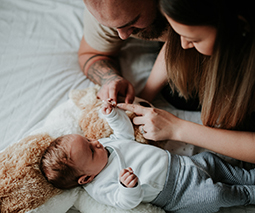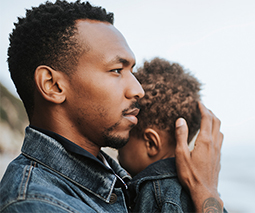10 common questions couples ask when trying to have a baby

Deciding to have a baby is a fun and exciting time for a couple. But finding answers to all the questions you have can be overwhelming.
Dianne Zalitis is a midwife and Clinical Lead of Pregnancy Birth and Baby, an Australian Government service providing support for expecting parents. She answers some common questions parents have when trying to conceive.
1. Do I need to be fit and healthy to fall pregnant?
“It all helps,” says Dianne. “It makes a lot of difference to how quickly you’ll conceive.”
If you start your pregnancy fit and healthy, that can make some of the other challenges a bit easier. In saying that, if you do find yourself pregnant before starting that well-intentioned exercise regime, that’s okay too!
“If you’re already pregnant and you didn’t get fit and healthy, you shouldn’t beat yourself up over it,” says Dianne.
Pregnancy isn’t the time to start a drastic overhaul in the exercise department. Instead, Dianne says walking and swimming are wonderful ways to keep moving.
Listen to Dianne Zalitis on Feed Play Love:
2. Does age impact my chances of getting pregnant?
Fertility starts to decline around 32 years of age for women, with the chance of conceiving continuing to drop a little more rapidly after 35. And despite the focus of fertility being mainly on women, men have a biological clock too.
“It also applies to men,” says Dianne. “We often think this [applies to] just us girls. But men’s fertility does decrease as well. I know there are plenty of stories about men who fathered babies into their 70s and 80s. But, still, a man at 35 is half as fertile as he was at 25.”
3. How does smoking affect a baby?
There’s no way to sugar coat it: smoking reduces the growth and development of a baby.
“Often that’s why babies of mums who smoke are smaller because, overall, their organs are smaller. So going forward in life, that’s going to impact all of their health,” explains Dianne.
The habit can also reduce your chances of falling pregnant. And, if you do fall pregnant, further complications become more common, including your baby being born pre-term.
“[Smokers] have a much higher chance of miscarriage or an ectopic [pregnancy] … and it also does funny things to the placenta, reducing its size and how well it functions,” says Dianne.
For men, smoking affects sperm health and the ability to conceive a baby. Not to mention, second-hand smoke is just as harmful to mum and bub as it is for dad.
“If you are smoking, there is lots of support and things that you can do to reduce your smoking amount, or even use nicotine replacement; that’s safer than smoking.”
4. Alcohol and pregnancy: What is safe?
When it comes to alcohol and pregnancy, there aren’t any known safe levels of consumption.
However, if you find out you are pregnant and realise that you have consumed alcohol, Dianne says: “Please don’t panic.”
“Go talk to your doctor and midwife. There are tests they can do to see if there is any harm. But for the most part, there isn’t any. It’s consistency with alcohol over time. But we do strongly suggest that once you know [you’re pregnant], that you don’t have any.”
5. What is the best way to take folic acid?
Folic acid is essential for preventing what’s called a neural tube defect.
“That’s the part of your baby that’s going to make your baby’s brain and your baby’s spine. So we recommend that if you’re planning to be pregnant, that you take a supplement at least a month before you conceive,” says Dianne.
“So as soon as you know you want a baby, start taking pregnancy vitamins that have folic acid in them and then keep taking that for the first three months of pregnancy.
“You can also get it through dark, leafy green vegetables and chickpeas and lentils and beans. And a lot of bread is fortified with it now. But we still recommend that you take the supplement.”
6. What about STIs or any other sexual infections?
The biggest issue with sexually transmitted infections is that if they’re if left undetected, they can cause infertility.
“Chlamydia is a big one. It’s one you may not know you have, but can cause pelvic inflammatory disease. So the infection is in your fallopian tubes and causes them to scar and block, so there’s no pathway for the egg and sperm to meet in,” explains Dianne.
“When you’re thinking about and planning pregnancy, that’s one of the tests you can have at your doctor’s and have that cleared up.”

7. How does polycystic ovarian syndrome affect getting pregnant?
A symptom of polycystic ovarian syndrome is that it causes a woman’s period to be irregular, which means she won’t regularly be ovulating – making conception very tricky.
“So if you understand how your cycle works, you will ovulate, and two weeks later, you’ll have your period. Then you use that four weeks to kind of guide yourself to know when your window of opportunity is.
“But if your periods are irregular, then you don’t have enough of a regular warning as to when you might ovulate. So that’s why it has an impact on fertility.”
“There are a whole host of tests, so your doctor can check and see if that [polycystic ovary syndrome] is an issue.”
8. How can men boost their fertility?
Men’s health is just as important as women’s when having a baby.
“It’s really important to consider him in the picture because he’s half of the equation,” says Dianne. “There are things that he may not think about, like depending on where you work, chemicals that you’re exposed to can affect both your fertility and the health of your sperm. Taking recreational drugs, if you’re have taken steroids, things like that can affect [fertility].
Other steps he can take to boost fertility are stopping smoking, having a healthy diet and being fit and well. Keeping his testicles cool is also important.
9. Why aren’t we falling pregnant?
It can be disheartening for couples if pregnancy doesn’t happen right away.
“[Trying to conceive] can be a really tough time. And it’s really about understanding each other’s perspective and keeping your lines of communication open and talking to each other,” says Dianne.
Remember, the mixed bag of emotions couples feel is normal.
“The best thing is to focus on the things that you can do. So it’s staying well physically and emotionally. Focus on your relationship. Stay strong together, talk to each other and get help.
“There are lots of websites and online services that can help you as well because there are a lot of people who go through this. It’s like one in six couples will experience infertility of some degree.”
10. When should I visit a doctor?
According to the Pregnancy Birth and Baby website, you should see your doctor if:
- You’re under 35 and have been trying unsuccessfully for 12 months or more.
- You’re over 35 and have been trying for six months.
- You think you or your partner may have problems with fertility.
 Join the Bump and Baby: The Fourth Trimester online event! With live expert sessions, FREE newborn routine guide & the chance to WIN a $500 Nursery gift voucher. Click here to find out more and make sure you don’t miss a thing!
Join the Bump and Baby: The Fourth Trimester online event! With live expert sessions, FREE newborn routine guide & the chance to WIN a $500 Nursery gift voucher. Click here to find out more and make sure you don’t miss a thing!













